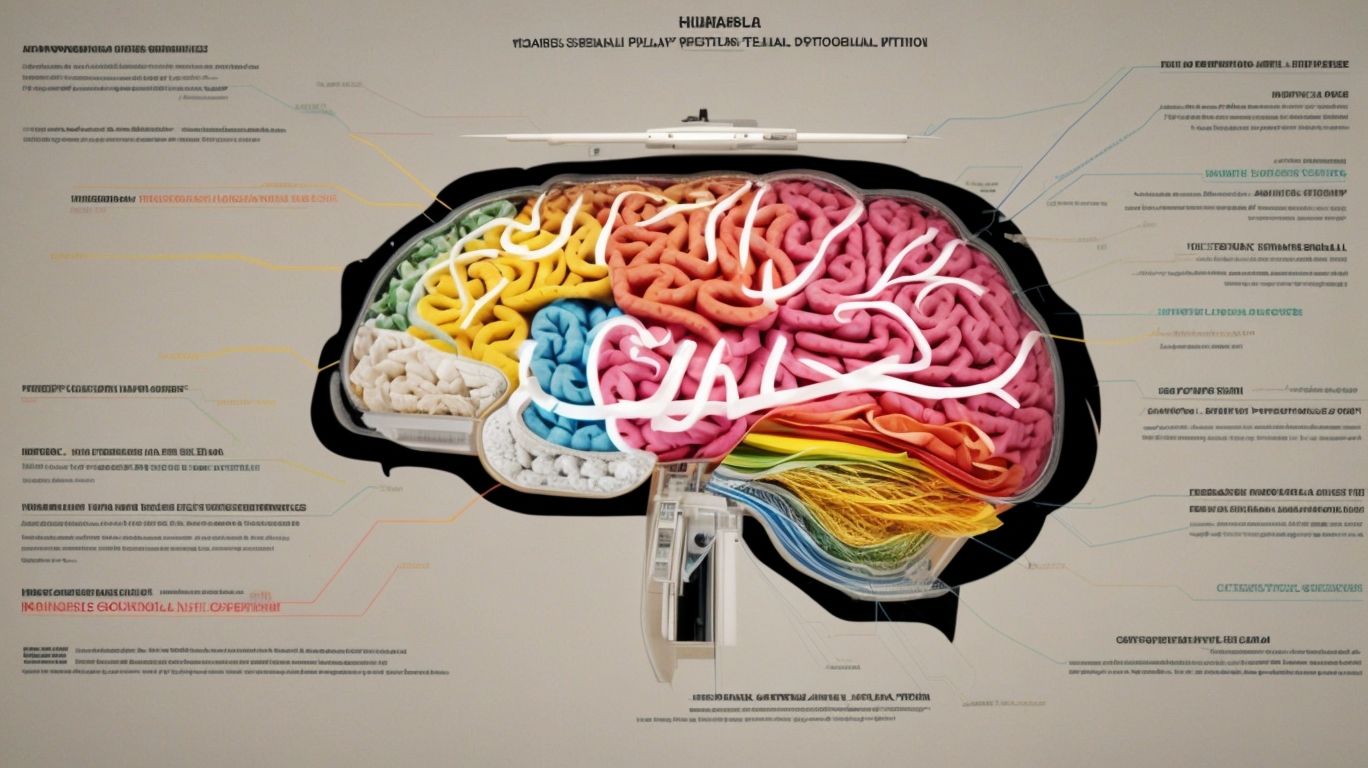Cognitive psychology is a fascinating field that delves into the intricate workings of the human mind. In this comprehensive overview, we will explore the history, key areas, and applications of cognitive psychology.
From the early influences to the cognitive revolution, we will trace the evolution of this discipline. We will also delve into the six key areas of cognitive psychology, including perception, attention, memory, language, decision making, and problem solving, and how they interact.
We will examine the practical applications of cognitive psychology in fields such as education, artificial intelligence, and marketing. We will discuss the current research and future directions in this dynamic and evolving field. Join us as we uncover the captivating world of cognitive psychology.
Contents
Key Takeaways:
- Cognitive psychology studies mental processes like perception, attention, memory, language, decision-making, and problem-solving.
- The influence of early philosophers and the cognitive revolution led to the development of cognitive psychology as a distinct field.
- Cognitive psychology has diverse applications in education, artificial intelligence, and marketing, and is constantly evolving through current research and future directions.
What Is Cognitive Psychology?
Cognitive psychology is a branch of psychology that focuses on the study of mental processes, including attention, memory, and decision-making.
Cognitive psychology examines how people perceive, think, remember, and learn by analyzing internal mental processes.
This field seeks to understand how individuals acquire, process, and store information. Attention is a key aspect studied in cognitive psychology, with research focusing on how individuals select, sustain, and switch attention.
Memory processes are explored in depth, including encoding, storage, and retrieval mechanisms. Decision-making is another crucial area, involving the investigation of reasoning, problem-solving, and judgment.
These studies provide valuable insights into human behavior and cognitive functioning.
The History of Cognitive Psychology
The history of cognitive psychology is marked by significant milestones, including the cognitive revolution spearheaded by Ulric Neisser, which reshaped the landscape of experimental psychology and led to groundbreaking insights into memory disorders.
During the mid-20th century, Ulric Neisser played a pivotal role in propelling cognitive psychology into the forefront of psychological research.
His influential book, ‘Cognitive Psychology’, published in 1967, challenged behaviorism and emphasized the significance of internal mental processes in understanding human behavior.
The cognitive revolution marked a shift towards studying memory, perception, language, and problem-solving. This shift sparked advancements in understanding memory disorders, such as Alzheimer’s disease and amnesia, elucidating the intricate workings of the human mind.
Early Influences
Early influences on cognitive psychology encompassed explorations into human cognition, the advent of brain imaging technologies, and the development of computational models to simulate mental processes.
Researchers delved into the complexities of human cognition, aiming to decipher the mechanisms underlying perception, memory, and problem-solving.
The emergence of brain imaging tools, such as fMRI and PET scans, revolutionized the study of cognitive processes by providing unprecedented insights into neural activity.
Concurrently, the introduction of computational models enabled psychologists to simulate intricate mental processes, facilitating the understanding of phenomena like decision-making, language comprehension, and attention.
The Cognitive Revolution
The cognitive revolution in psychology sparked a paradigm shift, paving the way for the integration of cognitive neuroscience and the emergence of a new generation of cognitive psychologists.
This convergence of cognitive psychology and neuroscience transformed the study of the mind, enabling researchers to delve into the intricate workings of the brain, and understand the underlying cognitive processes.
As a result, a new wave of cognitive psychologists emerged, armed with advanced tools and techniques to explore the complex relationship between the mind and the brain.
This interdisciplinary approach has significantly enriched our comprehension of human cognition, leading to breakthroughs in areas such as memory, decision-making, and problem-solving.
The 6 Areas of Cognitive Psychology
Cognitive psychology encompasses six core areas, namely perception, attention, memory, language, decision-making, and problem–solving, each contributing to a comprehensive understanding of mental processes.
Perception is the process of interpreting sensory information, enabling individuals to perceive and make sense of the world around them. Attention involves the ability to focus on specific stimuli while filtering out distractions.
Memory encompasses the storage, retention, and retrieval of information, allowing individuals to recall past experiences and knowledge. Language plays a crucial role in communication, forming the basis for expressing thoughts and understanding others.
Decision-making involves the process of evaluating alternatives and making choices, while problem-solving entails finding solutions to complex issues through cognitive processes.
Perception
Perception, a crucial domain in cognitive psychology, involves the interpretation of sensory input, formation of concepts, and the application of cognitive abilities to comprehend the environment.
In sensory interpretation, individuals rely on their visual, auditory, olfactory, tactile, and gustatory senses to process information from the surrounding environment. This sensory data is then processed by the brain to make sense of the world.
Concept formation entails the organization and categorization of these sensory inputs into meaningful mental representations. The utilization of cognitive abilities, such as attention, memory, and problem-solving, contributes to individuals’ understanding of the world and their interactions within it.
Attention
Attention, a pivotal element in cognitive psychology, encompasses processes such as information processing, cognitive mapping, and the selective allocation of mental resources.
Information processing involves the reception, interpretation, and storage of sensory information.
Cognitive mapping relates to the mental representation of physical spaces and environments, guiding an individual’s navigation and interaction within their surroundings.
The selective allocation of mental resources refers to the ability to focus on specific stimuli or tasks, while filtering out irrelevant information.
Memory
Memory, a fundamental aspect of cognitive psychology, encompasses the study of memory disorders, the impact of brain injury on memory, and the underlying mechanisms of memory processes.
Memory disorders, such as amnesia and dementia, significantly affect an individual’s ability to form new memories or retrieve existing ones. The damage to specific brain regions caused by these disorders can disrupt memory consolidation, storage, or retrieval processes, leading to profound cognitive impairment.
Brain injuries, such as concussions or trauma, can have varying effects on memory, depending on the severity and location of the injury. The disruption of neural pathways or the loss of brain tissue can interfere with the encoding and recall of memories, causing memory deficits.
The mechanisms involved in memory processes are intricate and multifaceted, involving neurotransmitters, synaptic connections, and neural circuits. These processes encompass sensory memory, short-term memory, long-term memory, and the intricate interplay between encoding, storage, and retrieval.
Language
Language, a significant area of study in cognitive psychology, involves the exploration of language processing, linguistic phenomena, and speech-language disorders within the framework of mental processes.
This field delves into how individuals acquire, comprehend, and produce language, examining the complex cognitive mechanisms involved in these processes.
Linguistic phenomena, such as syntax, semantics, and phonology, are pivotal areas of investigation, shedding light on the intricate structures and rules governing language.
The study of speech-language disorders offers valuable insights into the disruptions that can occur in language production and comprehension, contributing to the development of effective interventions and therapies for individuals affected by such conditions.
Decision Making
Decision-making, an integral aspect of cognitive psychology, encompasses the processes of reasoning, judgment, and problem-solving that underpin human choices and behavioral outcomes.
These processes occur in various contexts, ranging from simple everyday decisions to complex strategic choices.
Reasoning involves the use of logic and evidence to reach conclusions, while judgment incorporates personal values and experiences.
Problem-solving, on the other hand, requires identifying, analyzing, and resolving obstacles.
The intricate interplay of these cognitive mechanisms significantly influences individuals’ actions and responses, shaping their interactions with their environment and impacting their overall well-being.
Problem Solving
Problem solving, a core focus of cognitive psychology, involves the application of cognitive processes, reasoning strategies, and mental tools to address complex challenges and achieve solutions.
Cognitive psychology delves into the intricacies of how individuals perceive, process, and act upon information to solve problems.
The cognitive processes encompass a range of functions, including attention, memory, and decision-making, which play critical roles in problem-solving scenarios.
Reasoning strategies, such as deductive and inductive reasoning, guide individuals in drawing conclusions and making decisions.
The utilization of mental tools, such as heuristics and algorithms, aids in navigating through complex problems by providing systematic approaches to find solutions.
How Do These Areas Interact?
The interplay of cognitive psychology’s areas involves a complex web of interactions, where decision-making, attention, memory, perception, language, and reasoning processes synergistically contribute to human cognition and behavior.
Decision-making plays a crucial role in shaping behavior and influencing subsequent cognitive processes. Attention acts as a filter, determining which stimuli will be processed and remembered.
Memory serves as the repository of past experiences, influencing decision-making and perception. Perception shapes how individuals interpret and react to the environment, underpinning language understanding and reasoning processes.
The complex interactions among these cognitive domains highlight the intricate nature of human cognition and behavior, with each area influencing and being influenced by others in dynamic ways. Understanding these interconnected systems is critical for exploring and explaining the complexities of human thought and action.
Applications of Cognitive Psychology
Cognitive psychology finds diverse applications in fields such as education, artificial intelligence, marketing, and advertising, harnessing insights into human cognition to drive innovation and effectiveness in various domains.
In the realm of education, cognitive psychology sheds light on how individuals learn, remember, and solve problems. Understanding these processes helps educators design more effective teaching approaches and tailor learning experiences to students’ needs.
In the world of artificial intelligence, cognitive psychology informs the development of systems that can perceive, reason, and learn similar to humans, advancing the capabilities of AI.
The strategic utilization of cognitive insights in marketing and advertising enables the crafting of campaigns that resonate with consumers’ perceptions, emotions, and decision-making, paving the way for impactful communication and brand success.
Education
Cognitive psychology’s contributions to education encompass tailored interventions for learning disabilities, the implementation of cognitive therapies, and the integration of behavioral therapies to enhance learning outcomes.
One of the most significant aspects of cognitive psychology in education is its focus on the individualized nature of interventions for learning disabilities.
Understanding the unique cognitive processes of each student allows educators to develop personalized strategies that address specific challenges and promote learning success.
The application of cognitive therapies, such as cognitive-behavioral therapy, aids in fostering adaptive thinking patterns and emotional regulation, contributing to improved academic performance.
The integration of behavioral therapies, including positive reinforcement and self-regulation techniques, plays a vital role in shaping favorable learning behaviors and enhancing overall educational experiences.
Artificial Intelligence
Cognitive psychology’s impact on artificial intelligence encompasses the development of computational models, the design of intelligent agents, and the exploration of human-like cognitive processes to advance AI capabilities.
This integration leads to the creation of systems that can interpret, understand, and respond to complex stimuli in a manner that mirrors human cognition.
By leveraging cognitive psychology principles, artificial intelligence seeks to replicate reasoning, problem-solving, language comprehension, and decision-making processes inherent to human intelligence.
By studying the intricate workings of the human mind, researchers aim to develop AI systems that can adapt, learn, and interact with their environment in a more nuanced and human-like way.
Marketing and Advertising
Cognitive psychology’s applications in marketing and advertising involve leveraging insights into human cognition, emotional intelligence, and behavioral tendencies to create impactful strategies and campaigns that resonate with target audiences.
By understanding how individuals process information, make decisions, and respond to various stimuli, marketers can craft campaigns that align with the cognitive processes and emotional triggers of their target audience.
Leveraging emotional intelligence in advertising enables brands to connect with consumers on a deeper level, fostering brand loyalty and increasing engagement.
By addressing consumers’ behavioral tendencies in marketing strategies, such as the power of social influence and the impact of cognitive biases, brands can optimize their messaging and promotional efforts for greater effectiveness.
Current Research and Future Directions
Current research in cognitive psychology and its future directions encompass the exploration of cognitive neuroscience, the enhancement of intelligence, advancements in addressing learning disabilities, and the evolution of cognitive therapies for improved mental health outcomes.
This ongoing exploration of cognitive neuroscience offers a promising avenue for understanding the intricate workings of the human mind.
Researchers are looking into the neural mechanisms underlying cognitive processes such as attention, memory, and decision-making, paving the way for innovative interventions.
The quest for intelligence enhancement involves diverse approaches, including technological interventions and educational strategies to optimize cognitive function.
In addressing learning disabilities, recent studies have focused on individualized interventions tailored to specific cognitive profiles, offering hope for more effective support.
The evolution of cognitive therapies showcases a shift towards holistic approaches that integrate psychological, biological, and social factors for enhanced mental health outcomes.
Frequently Asked Questions
1. What are the 6 areas of cognitive psychology covered in this overview?
The 6 areas of cognitive psychology covered in this overview are perception, attention, memory, language, problem-solving, and decision-making.
2. How does perception play a role in cognitive psychology?
Perception refers to the process of organizing and interpreting sensory information, and it plays a crucial role in how we understand and interact with the world around us. In cognitive psychology, perception is studied to understand how our brains process and interpret incoming information.
3. What is the significance of studying attention in cognitive psychology?
Attention refers to our ability to focus on specific information while filtering out distractions. It is a fundamental aspect of cognition and is essential in many cognitive processes such as learning, problem-solving, and decision-making.
4. How does memory impact our cognitive processes?
Memory is the process of encoding, storing, and retrieving information. It is a crucial aspect of cognition as it allows us to retain and use information to guide our behavior and decision-making.
5. How is language studied in cognitive psychology?
Language is a complex cognitive process that involves understanding, producing, and using words and sentences to communicate. In cognitive psychology, language is studied to understand how we acquire, process, and use language to communicate.
6. What is the role of problem-solving and decision-making in cognitive psychology?
Problem-solving and decision-making are essential cognitive processes that allow us to overcome challenges and make choices. In cognitive psychology, these processes are studied to understand how we approach and solve problems and how we make decisions based on available information.



